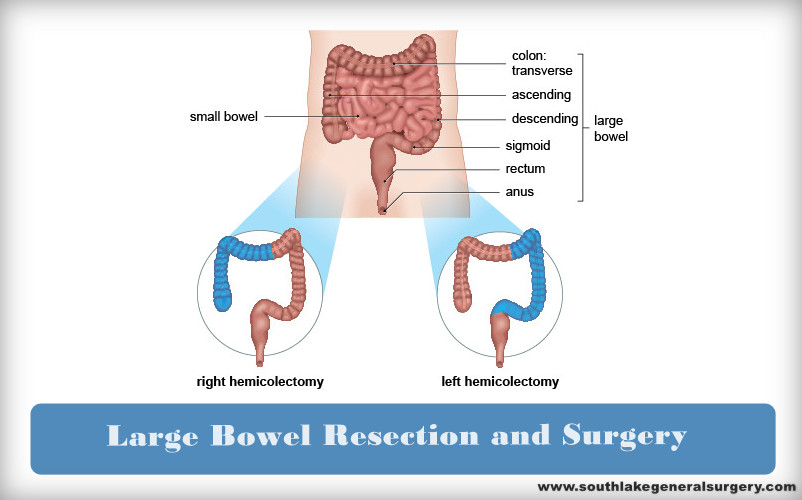A large bowel resection procedure is also called a colectomy. The objective of this surgical procedure is to eliminate unhealthy parts of large bowel and reconnects the healthy parts or surgeon might remove all or part of bowel. The large bowel is also the large intestine or the colon.
Your surgeon may suggest a colostomy if there’s not enough healthy digestive system after surgery. During a colostomy procedure, your specialist moves one end of large intestine to the outside of abdominal wall and appends a colostomy sack to abdomen. At the point when stool goes through large intestine, it channels into the pack. The stool that goes into the sack is normally soft or fluid.
A colostomy is usually temporary. You’ll have the sack until intestines heal completely. During another operation, surgeon would then be able to eliminate the colostomy. At times, in few cases, the colostomy can be permanent.
What are the reasons for a large bowel resection?
A large bowel resection procedure might be important to treat conditions, such as,
- Colon cancer
- infection
- precancerous polyps
- intestines bleeding
- ulcerative colitis is a kind of bowel inflammation
- intestinal blockages happen due to scar tissue or tumors
- diverticulitis, which is an infection of the large bowel
- volvulus is an unusual twisting of the bowel
- intussusception, that happens when one portion of intestine slides into another portion of intestine
Risk associated with a large bowel resection
A wide range of a surgical procedure convey some risk. These risks may include:
- bleeding
- problem in breathing
- heart attack or stroke
- infection
- pneumonia
- blood clots
- adjacent structures damage
The risks that are explicit to a lower bowel resection include:
- bleeding inside the abdomen
- scar tissue
- colostomy problems, for example, skin inflammation
- bladder damage or damage to other close by organs
- an incisional hernia, that happens when tissue gets through the surgical incisions
- dehiscence is an opening of a surgical wound
There are likewise chances related with general anesthesia. These incorporate responses to drug and breathing challenges.
What to do for a large bowel resection?
Minimum two weeks prior to your surgery, inform your PCP concerning all the medicines and treatment you’re taking. You should incorporate supplements like nutrients and herbs. You should likewise tell them about any recent sicknesses including any colds, fever, or herpes breakouts.
Prior to surgery, your surgeon may require you to:
- stop taking blood-thinning medications, like aspirin, ibuprofen, naproxen, etc.
- quit smoking
- increase the water intake
- take high fiber meals
A couple of days before you have a large bowel resection, you may have to:
- take laxatives to clean your intestine
- have an enema to clear the colon
- drink just clear fluids, like water, fresh juice, and stock
On the surgery day, adhere to your surgeon’s guidelines. You may have to abstain from eating or drinking anything for 12 hours prior to your surgery.
What is the procedure of a large bowel resection?
Before surgery you will be given general anesthesia. This will let you sleep during the operation and you will not feel any pain. Your surgeon will also inform you about the type of surgical procedure they are going to use to treat the condition and it could be laparoscopic colectomy or open colectomy.
In a laparoscopic colectomy at southlake general surgery, texas, our surgeon uses a small thin tube with a camera on top to get a clear view on intestines. This medical procedure is performed through a progression of small cuts. It’s less intrusive than open colectomy.
In an open colectomy, your surgeon makes a large incision in abdomen to view the intestines.
The fundamental structure of these two surgeries is same. The surgeon gets to bowel utilizing at least one cuts and eliminates the unhealthy or damaged bowel. The leftover bowel is stapled or stitched together. This is called an anastomosis. Surgeon will likewise perform a colostomy if necessary. They’ll close the incision with sutures or stitches.
Sometimes, your surgeon may likewise have to remove other organs during the surgical procedure.
After a large bowel resection
You’ll by and large stay in the hospital for three to seven days. You may have to remain in the hospital longer if your body develop any complications. You may likewise have to remain longer if you have a more sever health issues.
You’ll need to adhere to post surgery guidelines about how and what to eat after your surgery. You’re usually ready to drink clear fluids from second or third day. As you mend, you’ll have the option to drink thicker liquids and eat soft meals.
A complete recovery after a large bowel resection may take up to two months.
What is the long-term Viewpoint?
Many people who have a large bowel resection gets a complete recovery. You may need to utilize a colostomy pack temporarily. You may likewise require a perpetual colostomy. A colostomy doesn’t typically stop you from doing the exercises you appreciate.
You may require progressing medical assistance if you have a chronic bowel condition, like Crohn’s disease, cancer, or ulcerative colitis.
For more information on Colectomy: causes, symptoms, diagnosis, treatment and consultation. Please contact our healthcare expert for quick appointments at +1(817) 748-0200 or Click Here to make an online appointment with us.

